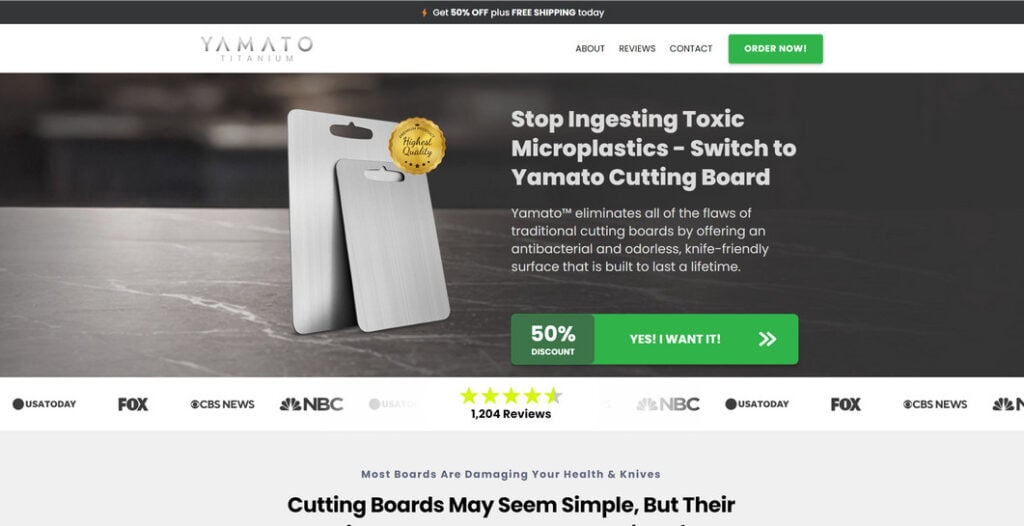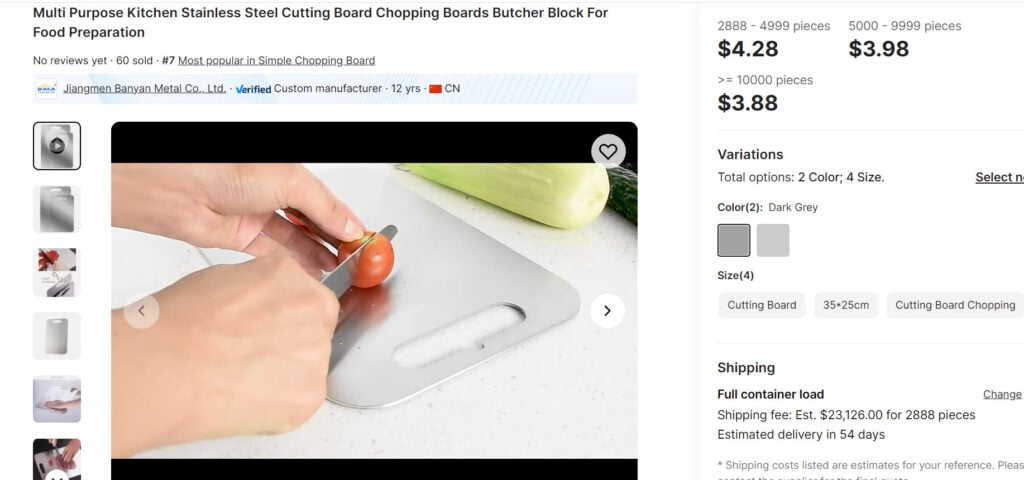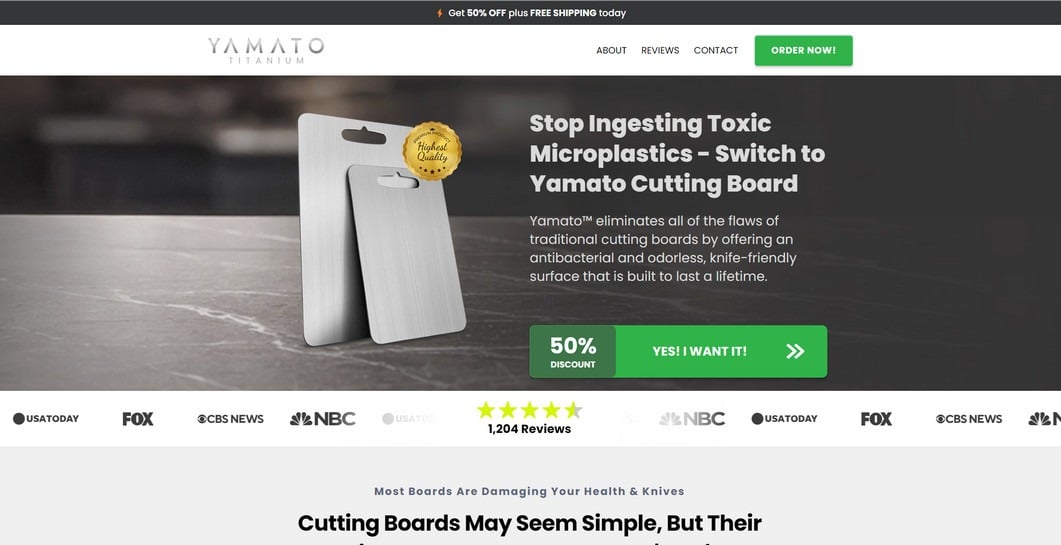Cutting boards are a kitchen essential, but choosing the right one matters. Recently, the Yamato Titanium Cutting Board has exploded in popularity thanks to aggressive marketing on social media platforms like Facebook and TikTok. With lofty claims of being the ultimate cutting board made from premium Japanese titanium, the Yamato has captured the attention of many home cooks.
However, as is often the case with viral products, questions abound about whether the Yamato lives up to the hype. In this in-depth investigation, we’ll scrutinize the claims versus reality to determine if the Yamato Titanium Cutting Board is truly as amazing as advertised or just another overhyped product.

Overview of the Yamato Titanium Cutting Board
As seen in the ubiquitous social media ads, the Yamato Titanium Cutting Board is marketed as a cutting-edge kitchen innovation made from high-grade titanium. It is touted as being odorless, antibacterial, ultra-durable, and gentle on knives.
The ads feature persuasive testimonials from supposedly satisfied customers raving about the Yamato’s premium quality and how it has revolutionized their cooking. Visually, the cutting board looks elegant with its sleek titanium design, fitting seamlessly into any modern kitchen aesthetic.

According to the Yamato website, the board is meticulously engineered in Japan to stringent quality standards for professional kitchens. It is hailed as the pinnacle of cutting board technology, addressing all the flaws of traditional materials like wood, plastic, glass, and bamboo.
The marketing states the titanium construction makes the Yamato completely resistant to scratches, stains, odors and germs. As a result, it can be used for decades without wearing out. The ultra-hard surface is also said to keep knives sharper longer compared to softer cutting boards.
With all these purported benefits, it’s no wonder the Yamato Titanium Cutting Board has captured so much attention. It seems to solve all the problems of regular cutting boards. But does real-world experience with the product confirm all these claims? Let’s take a closer look.
Questionable Marketing Tactics and Dubious Claims
The marketing for the Yamato Titanium Cutting Board aggressively uses many standard tactics aimed at driving sales and lending credibility:
- Fake scarcity warnings of “high demand” and “limited stock”
- Countdown timers pressuring customers to buy before time runs out
- Celebrity endorsements and fake news logos implying credibility
- Dubious claims not backed by any evidence or expert sources
The Yamato website also proudly displays over 1200 supposed customer reviews averaging a almost perfect 5-star rating. However, all the reviews appear suspiciously generic and vague. Searching for Yamato reviews outside the company’s website turns up little besides affiliate marketing sites.
There are multiple concerning issues with the claims being made as well:
- No material details are provided about the titanium composition or properties. What grade titanium is used? There are many types with varying hardness, quality, and cost.
- Assertions that the board is odorless, antimicrobial, ultra-durable, etc. are not backed by any lab testing or data. These claims cannot be taken at face value without independent verification.
- Statements about being expertly engineered and rigorously inspected are vague marketing speak without tangible proof or transparency behind the manufacturing process.
Essentially, we are expected to simply trust all of the Yamato’s supposed qualities and benefits with no concrete evidence provided. But should we? Let’s see what people who have actually used the Yamato have to say.
Negative Experiences and Reviews
Looking past the promotional material paints a concerning picture about the Yamato Titanium Cutting Board. Scores of negative reviews reveal some glaring problems:
- The cutting board is thin, lightweight and flimsy – not substantial enough for heavy cooking as claimed. It can bend, warp and lacks the heft expected of a premium titanium board.
- Rather than titanium, the material appears to actually be inexpensive stainless steel. Many customers found it stamped “SUS304” which is a grade of stainless steel, not titanium.
- The surface scratches, stains, and loses its luster easily with regular kitchen use, contradicting claims of being ultra-durable.
- No noticeable benefits compared to cheap plastic or wood boards. Does not stay cleaner, resist odors, or prolong knife sharpness as advertised.
- The Yamato cutting board delivered is smaller in dimensions than listed. Customers report feeling ripped off by the undersized product.
- Customers had extreme difficulty getting refunds after receiving a substandard product totally unlike marketed. Many felt scammed once they experienced the real Yamato board.
Clearly, the Yamato Titanium Cutting Board fails to live up to expectations set by the marketing in fundamental ways.
All Signs Point to a Dropshipping Scam
Dropshipping scams are rampant these days, so anytime you come across a product like the Yamato heavily marketed through social media ads, scrutiny is required. The following characteristics all point strongly to the Yamato being a dropshipping operation focused on profits over quality:
- No company address or location, registered offshore
- Website only sells the one product, no “About Us” info
- No mention of the Yamato prior to recent ad campaigns
- Reviews only on their site, nowhere else online
- Complaints of wrong material, undersized items, etc. being shipped
- Unable to get refunds or reach any real customer service
Essentially, flashy ads are used to sell overpriced, low-quality boards to as many people as possible before word spreads. Priority is put on margins over establishing a reputable brand. Everything about the Yamato Titanium Cutting Board is aligned with deceptive dropshipping tactics.
Buyer Beware – Only $4 on Alibaba
The clinching proof that the Yamato is a scam comes from the fact identical (or worse) cutting boards can be bought wholesale for around $4 on sites like Alibaba and resold for a 60x markup. Customers thought they were buying an exclusive high-tech titanium cutting board, but received a generic stainless steel board worth a couple dollars.

This massive disconnect between the actual minimal product cost versus the inflated sales price charged to shoppers confirms the Yamato exists solely to prey on uninformed buyers. Even if made from titanium, no cutting board with a production cost under $5 could justify the $200+ pricing.
Frequently Asked Questions about the Yamato Titanium Cutting Board Scam
1. What is the Yamato Titanium Cutting Board?
The Yamato Titanium Cutting Board is a cutting board heavily marketed through social media ads and affiliate sites. It is advertised as a high-end titanium board engineered in Japan, but many red flags indicate it is a dropshipping scam.
2. What claims are made about the Yamato Cutting Board in the ads?
The marketing touts it as odorless, antimicrobial, durable for decades, gentle on knives, and superior to other cutting board materials. But these claims lack substantive proof.
3. Does the Yamato Cutting Board perform as advertised?
No, most customers report it is a thin, lightweight stainless steel board that bends easily. It scratches, stains, and shows no benefits over cheap boards. It is not the premium product advertised.
4. What do customers really receive when they order the Yamato?
Customers receive small, low-grade stainless steel boards worth a couple dollars, not the durable, engineered titanium boards advertised in the marketing.
5. Should I buy the Yamato Titanium Cutting Board?
You will not receive the quality titanium board shown in the ads. Your money is better spent on reputable cutting board brands like John Boos or Epicurean.
This article is for educational purposes only and does not constitute professional, financial or legal advice. The content is intended for general information and should not be construed as definitive guidance. Information contained herein is subject to change without notice. For concerns, please contact us via the provided form.
If you are the owner of the website or product in question and wish to offer clarifications regarding your business or website, please reach out to us through the provided Contact Form.


